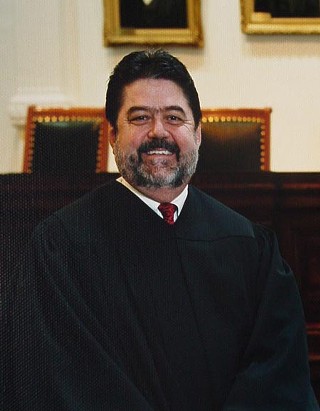CCA Jump-Starts the Death Machine
Executions resume after Court of Criminal Appeals rules against death row inmates' challenges
By Jordan Smith, Fri., June 20, 2008
In two opinions issued June 9, the state Court of Criminal Appeals cleared the way for executions to resume in Texas, after an eight-month hiatus imposed by federal legal challenges to lethal injection as an inhumane method of execution. Two days later, the state executed its first inmate since September, Karl Chamberlain, for a 1991 murder in Dallas. Another dozen inmates are currently scheduled for execution this year.
Ruling on challenges to the method of execution, filed by inmates John Alba and Heliberto Chi, a plurality of the court, led by Judge Barbara Hervey, ruled in Chi's case that Texas' tri-chemical method of lethal injection is "materially indistinguishable" from that used by the state of Kentucky, which the U.S. Supreme Court earlier this year ruled does not violate the prohibition against cruel and unusual punishments. The issue in that case (Baze v. Rees) was, in essence, whether "maladministration" of one of the three chemicals that make up the lethal injection cocktail would expose an inmate to unwarranted and excruciating pain. In that case – based on a full review of case and evidence record – the Supremes concluded that the "risks of maladministration [the inmates] have suggested – such as improper mixing of chemicals and improper setting of IVs by trained and experienced personnel – cannot remotely be characterized as 'objectively intolerable.'" Without similarly reviewing any evidence that the Texas experience with the tri-chem method of execution might be different from that in Kentucky, a CCA plurality adopted the language of the Supremes, opining that the Baze ruling applies equally in Texas. That allowed the court to conclude that Chi's claim to the contrary "has no merit" and therefore that he "cannot establish that he has a clear right to ... relief."
In ruling against the challenges brought by both Alba and Chi, the court also opined that inmates have no right to challenge the method of execution using the state's habeas corpus law. A habeas claim "must challenge the judgment against the applicant or seek to change his sentence," Judge Lawrence Meyers wrote for a plurality of the court in Alba's case – and challenging lethal injection doesn't qualify. The court agreed with the argument of the Texas attorney general that because neither inmate is "contesting the validity of his conviction or his death sentence" and instead seeks "only to challenge a circumstance of his conviction, habeas corpus cannot provide a remedy." (The U.S. Supreme Court in the past has allowed a challenge to execution method via a habeas writ but in recent years has suggested such challenges should be brought instead as civil rights claims.) Further, the CCA agreed with the state argument that because the Legislature granted authority "to determine the specific lethal-injection process" to the state's Department of Criminal Justice, challenging the process is "outside the scope of habeas corpus," Meyers wrote.
The court's reasoning was rejected in two strongly worded dissents – one filed by Judge Cheryl Johnson (joined by Judge Charles Holcomb), the other by Judge Tom Price. In her opinion, Johnson concluded that the plurality was wrong to merely adopt the Supremes' ruling in Baze with no other inquiry or review. "The federal courts have returned this case to us so that [Alba] may exhaust his state remedies on a claim of an Eighth Amendment violation," she wrote. "Our response is to close all avenues for review. When a claim of constitutional dimension is raised, there simply must be a mechanism for considering it on its merits."
In his even more scathing dissent, Price accused the plurality's rejection of the use of habeas corpus to challenge lethal injection as effectively "withholding the rudiments of due process." Price said the ruling reflects an "unseemly haste to crank the machine back up" and declared, "I cannot go along with this." State habeas should be available to an inmate seeking to assert the "one substantive constitutional right he unquestionably retains ... the right, when the time comes, to be executed in a humane manner," Price wrote. "I cannot accept that the Great Writ should not be an available remedy for the applicant to raise an Eighth Amendment challenge ... on the ground that it does not impact the 'fact or length,' of his confinement," Price continued. "Apparently the Court will not tolerate actual litigation of the issue if that means the death machine meanwhile must stand idle," he wrote. "But we cannot fix the machine while the cogs are turning."
Got something to say on the subject? Send a letter to the editor.









